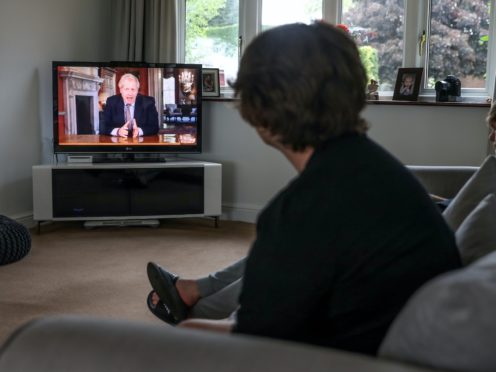Broadcast television viewing surged during lockdown, with more people tuning in for longer periods of time, but the boost was only fleeting, a new report has said.
From the middle of March 2020, the amount of time people spent in front of their TV sets increased and by April people were spending an average of more than 210 minutes per day watching, exceeding that of any April figure in the previous five years, the report into viewing habits during lockdown by Ofcom has found.
The easing of social restrictions in England in May and June saw monthly viewing figures decline compared to April but remain higher than the figures in those months in the previous two years.
As well as watching for longer, the proportion of the population tuning in to traditional broadcast TV in a week rose sharply in March 2020, peaking at 88% in the week commencing March 16 after people were told to stop non-essential contact with others and avoid pubs, restaurants and theatres.
This weekly reach figure was higher than in the same calendar week in 2019 and also remained higher year on year in the following week.
However, it dropped below the previous year’s levels after that and remained lower until the end of June at the end of the research period.
The only age bracket where it has remained consistently higher than in 2019 is among the over-54s.
This might be attributable to older people being more vulnerable to Covid-19 and therefore encouraged to self-isolate, Ofcom said.
The uptick in demand for broadcast television was driven by news, which achieved the biggest increase in viewing during lockdown.
On TV, average daily viewing minutes for news overtook that of recent years from March 9 and remained higher through to the middle of June, peaking on March 23, the day Prime Minister Boris Johnson first announced lockdown measures, when it rose to an average of 59 minutes, 349% higher than the 13 minutes viewed on the same date in 2019.
In the four calendar weeks from the start of lockdown, news and weather was the most viewed programme genre, accounting for a third of all individuals’ viewing, compared to 14% over the same period in 2019.
It accounted for 29% of 16-34-year-olds’ viewing, up from 10%.
News programmes dominate the list of the most watched programmes in the first half of 2020, accounting for all of the top five.
The Prime Minister’s broadcast on May 10, announcing the easing of lockdown plans, attracted an average audience of more than 27.6 million viewers watching live or on the same day, providing a viewing share of almost 90% across all seven channels that aired it, including +1 channels.
Some 18.8 million tuned in on BBC One alone, making it the most viewed programme on a single channel all year.
Mr Johnson’s lockdown announcement on March 23 averaged 28 million viewers across all channels, with 14.6 million watching on BBC One.
The Prime Minister’s special addresses were the most watched broadcasts since the closing ceremony of the 2012 London Olympic Games.
